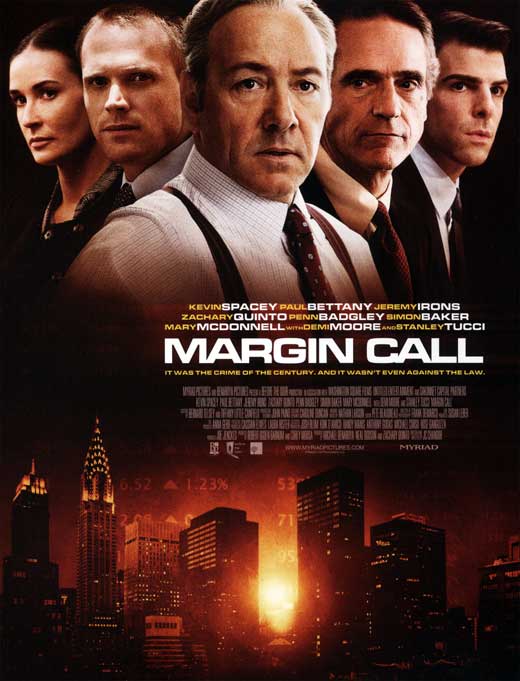Margin Call
 Over the holidays I watched the movie Margin Call (for the second time).
Over the holidays I watched the movie Margin Call (for the second time).
The movie is a fictional depiction of an investment bank crumbling during the 2008 financial crisis (it was likely inspired by the real life Bear Stearns or Lehman Brothers). The story revolves around a brilliant, young analyst in the company's risk management group. One night he discovers that the company has over-leveraged itself through an over-investment in synthetic CDOs and MBSs. Throughout the night and into the early morning the analyst's discovery makes its way to the highest levels of the company. The movie is a depiction of how the company handles the crisis.
Margin Call is a phenomenal movie. It's brilliantly acted by some excellent actors (Kevin Spacey, Jeremy Irons, Stanley Tucci, Zachary Quinto, Simon Baker and Demi Moore to name a few). And the suspense around watching management learn what has happened and how they handle it elegantly depicts what were probably real events inside many investment banks at the time. The more senior you were, the less likely you were to understand the financial mechanics behind the crisis.
In what is probably the best scene of the movie, the young analyst (played by Zachary Quinto) is asked to explain what he has discovered to the CEO of the company (played powerfully by Jeremy Irons). Irons' character says to him:
Maybe you could tell me what is going on. And please, speak as you might to a young child. Or a golden retriever. It wasn't brains that brought me here; I assure you that.
That line just about sums up much of the cause of the financial crisis of the late 2000s. The people on the ground were packaging and selling a product that management at our largest and most reputable financial institutions did not -- and could not -- understand.
If you haven't seen it yet, I highly recommend renting Margin Call.